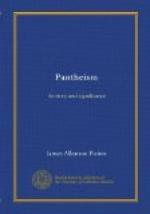But the inspiration of the time-spirit was not confined to the Christian Church. For the city of Alexandria, where that spirit seems to have been peculiarly potent as shown in the transfigured Judaism of Philo, was the birthplace of the Neo-Platonic school already mentioned above. And among its greatest members, such as Plotinus, Porphyry, Proclus, the religious influence of the East was distinctly apparent. True, they followed Socrates and Plato in reverence for knowledge as the unfailing begetter of virtue. But their speculations about the divine Being were touched by Oriental emotion. And we may with some confidence believe that their development of the Platonic Trinity owed a good deal to the rapid spread of Christianity. Thus the sentiment, the fervour, the yearning for “salvation,” the worship and devotion taught by the best of the Neo-Platonists were not so much, from Athens as from Sinai and Galilee. Yet, though there were in their world-conception many anticipations of the gospel of the “God-intoxicated man,” whom the counsels of the Eternal reserved for the fulness of times, it would scarcely be accurate to describe the system of any of them as strictly Pantheistic. For they were always troubled about “matter” as an anomalous thing in a divine universe, and in treating of it they hesitated between the notion of an eternal nuisance which the Demiurgus, or acting God, could only modify, not destroy, and, on the other hand, a strained theory of an evil nothing, which is yet something. Again, so far from realising Spinoza’s faith in God as so literally All in All that there is nothing else but He, they would not tolerate the contact of the Infinite with the finite, of God with the world. Consistently with such prepossessions, they held obstinately to the notion of some beginning, and therefore some ending of the ordered world. And this beginning was effected by emanations such as the Logos, or, as others had it, the world-soul and other divine energies, between the Eternal and creation; a phantasy which, however poetically wrought out, is not really consistent with Pantheism.
[Sidenote: The Gnostics.]
Such ideas of a hierarchy of subordinate emanations to fill the supposed abyss between the Infinite and the Finite were eagerly adopted and developed by the pseudo-philosophers called Gnostics, on both sides of the boundary between the Church and the World. Suffice it that, like most, though by no means all of their predecessors, they regarded the world of earth, sun, planet, stars, and animated nature with man at its head, as the whole Universe; and, assuming that it must have had a beginning, they vexed their souls with futile attempts to frame some gradual transition from the uncreated to the created, from the eternal to the mortal. The grotesque chimaeras engendered thus are remembered now only as illustrations of the facile transition from the sublime to the ridiculous and from philosophy to folly.




